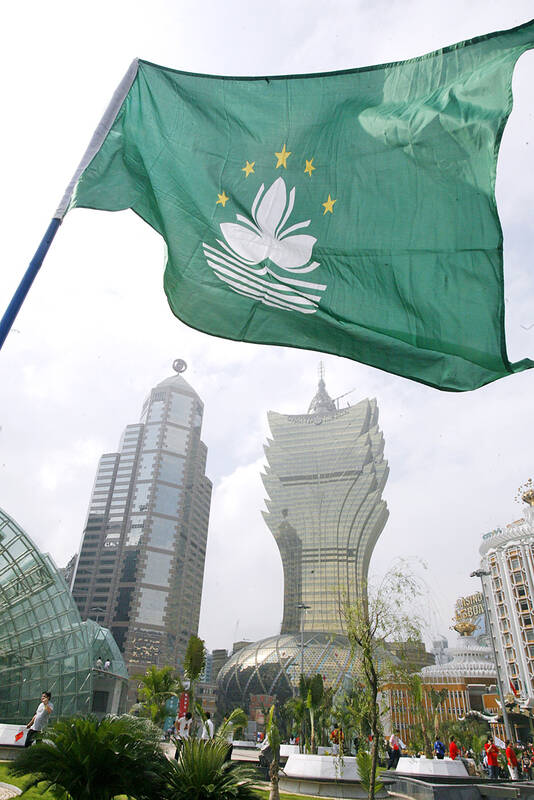The Mainland Affairs Council is closely monitoring if the authorities in Macau would try to force three remaining Taiwanese officials in the Office of Macau Affairs to sign a pledge to recognize the “one China” principle as a condition for them to receive a visa extension.
The three officials have all applied to extend their visas. Their applications have yet to be approved, the council said.
The last Taiwanese official is allowed to stay in Macau until Oct. 30 when their visa expires.

Photo: Reuters
Since 2019, Taiwanese officials and contractors working in the Office of Macau Affairs have been asked to sign an affidavit recognizing Beijing’s “one China” principle as a precondition for a visa, council sources said.
Those refusing to comply would be denied entry to Macau or their visas would not be extended, they said.
As China is getting ready to celebrate its National Day on Oct. 1, the government in Macau is very likely to try to force the three Taiwanese officials to sign the “one China” pledge, council sources said.
The post of director at the office in Macau has remained vacant since Chen Hsueh-huai (陳雪懷) retired in 2019.
As the requirement to sign a “one China” pledge has made it impossible to appoint a new director, the council had asked the Taiwanese officials whose visas have yet to expire to serve as acting directors since then.
In June last year, former acting director of the Office of Macau Affairs Chen Chia-hung (陳佳鴻) returned to Taiwan after refusing to sign the “one China” pledge.
The office would be left with only Macanese employees if the three Taiwanese officials in Macau are forced to leave, the council said.
Democratic Progressive Party (DPP) Legislator Wang Mei-hui (王美惠) yesterday said that the council does not need to wait until the final day to vacate the office in Macau.
“The ‘one China’ principle is designed to destroy the Republic of China and force Taiwanese to recognize the People’s Republic of China as the suzerain. Taiwan and China are two nations separated by the Taiwan Strait. Taiwanese officials will never sign such a pledge. Instead of waiting until the last day, the council needs to prepare for the possible outcome in advance, because there is no way that Taiwanese officials can be stationed in Macau without a visa,” Wang said.
Meanwhile, the council is considering selling the Dr Sun Yat-sen Memorial House in Macau if Macau refuses to extend the visas of the three remaining officials.
The council has full ownership of the memorial house, a property of the government registered under the name of a Singaporean firm.
The property with an area of 439.67m2 is valued at about NT$140 million (US$4.54 million), the council said, adding that it is the only place in China where Taiwan’s national flag can be displayed.
The council is leaning toward selling the property in case Beijing confiscates it after the last Taiwanese officials leave.

CHAOS: Iranians took to the streets playing celebratory music after reports of Khamenei’s death on Saturday, while mourners also gathered in Tehran yesterday Iranian Supreme Leader Ayatollah Ali Khamenei was killed in a major attack on Iran launched by Israel and the US, throwing the future of the Islamic republic into doubt and raising the risk of regional instability. Iranian state television and the state-run IRNA news agency announced the 86-year-old’s death early yesterday. US President Donald Trump said it gave Iranians their “greatest chance” to “take back” their country. The announcements came after a joint US and Israeli aerial bombardment that targeted Iranian military and governmental sites. Trump said the “heavy and pinpoint bombing” would continue through the week or as long

TRUST: The KMT said it respected the US’ timing and considerations, and hoped it would continue to honor its commitments to helping Taiwan bolster its defenses and deterrence US President Donald Trump is delaying a multibillion-dollar arms sale to Taiwan to ensure his visit to Beijing is successful, a New York Times report said. The weapons sales package has stalled in the US Department of State, the report said, citing US officials it did not identify. The White House has told agencies not to push forward ahead of Trump’s meeting with Chinese President Xi Jinping (習近平), it said. The two last month held a phone call to discuss trade and geopolitical flashpoints ahead of the summit. Xi raised the Taiwan issue and urged the US to handle arms sales to

BIG SPENDERS: Foreign investors bought the most Taiwan equities since 2005, signaling confidence that an AI boom would continue to benefit chipmakers Taiwan Semiconductor Manufacturing Co’s (TSMC, 台積電) market capitalization swelled to US$2 trillion for the first time following a 4.25 percent rally in its American depositary receipts (ADR) overnight, putting the world’s biggest contract chipmaker sixth on the list of the world’s biggest companies by market capitalization, just behind Amazon.com Inc. The site CompaniesMarketcap.com ranked TSMC ahead of Saudi Aramco and Meta Platforms Inc. The Taiwanese company’s ADRs on Tuesday surged to US$385.75 on the New York Stock Exchange, as strong demand for artificial intelligence (AI) applications led to chip supply constraints and boost revenue growth to record-breaking levels. Each TSMC ADR represents

State-run CPC Corp, Taiwan (CPC, 台灣中油) yesterday said that it had confirmed on Saturday night with its liquefied natural gas (LNG) and crude oil suppliers that shipments are proceeding as scheduled and that domestic supplies remain unaffected. The CPC yesterday announced the gasoline and diesel prices will rise by NT$0.2 and NT$0.4 per liter, respectively, starting Monday, citing Middle East tensions and blizzards in the eastern United States. CPC also iterated it has been reducing the proportion of crude oil imports from the Middle East and diversifying its supply sources in the past few years in response to geopolitical risks, expanding